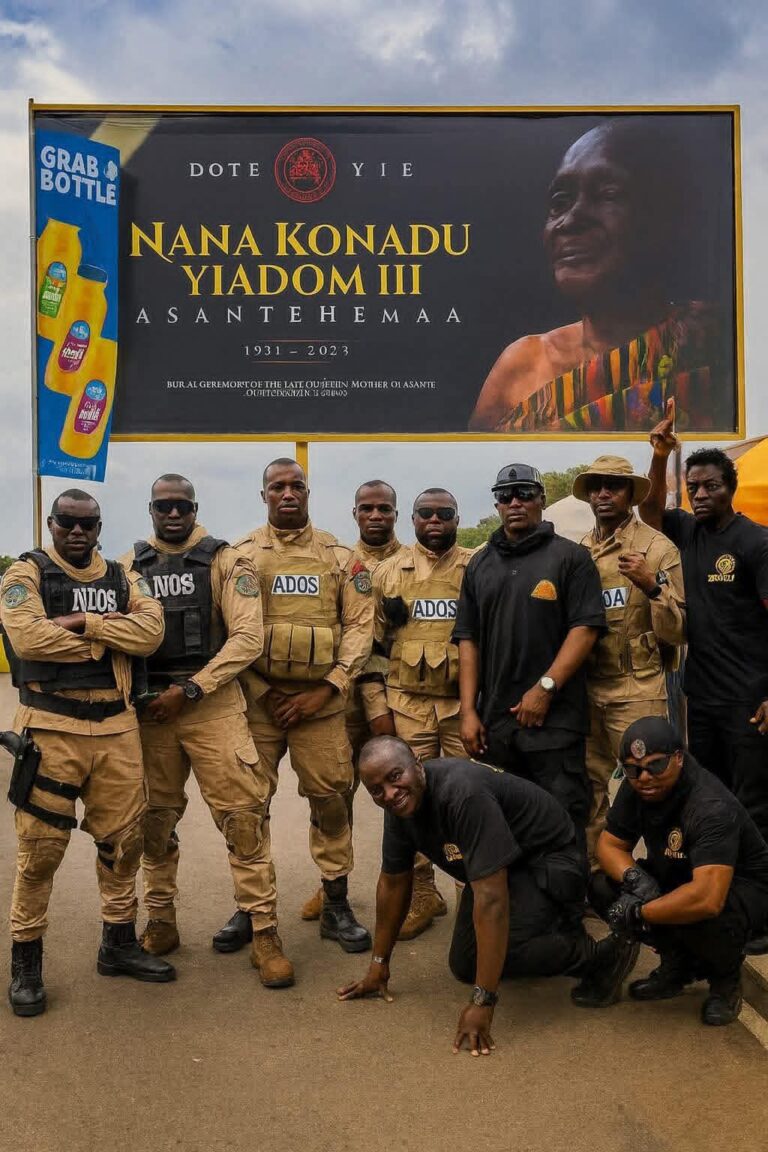The Ashanti Kingdom is renowned for its rich traditions, cultural influence, and historic resilience. For centuries, it has stood as a beacon of unity, dignity, and pride in Ghana and beyond. But the sudden appearance of a group calling itself the Ashanti Defense Force (ADF) during the solemn funeral and burial rites of the late Asantehemaa Nana Konadu Yiadom, has raised eyebrows.
The conspicuous presence of these men in paramilitary-style uniforms, tactical vests, and insignia. Identifying themselves as the “Ashanti Defense Force,” they conducted themselves in ways that resembled a militia rather than cultural guards.
Their militarized display raises deep concerns about Ghana’s national security and the dangerous precedent it sets.
A Threat Beyond Ashanti
Ghana’s Constitution and national security laws are unambiguous: only the Ghana Armed Forces, the Police, and allied state security agencies are empowered to perform security functions. Any attempt to form parallel forces is unlawful and destabilizing.
What makes the emergence of the Ashanti Defense Force alarming is not only their presence at such a high-profile funeral, but the broader message it sends. If this development is tolerated, what will stop other traditional councils, ethnic groups, or political factions from forming their own so-called “defense forces”
Imagine a Ghana where every Region parades its own militia under the guise of culture or tradition. The result would be an arms race of unauthorized paramilitary groups, heightening tensions, fueling mistrust, and undermining national unity.
Lessons from Vigilantism
Ghana has struggled in recent decades with vigilante groups attached to political parties. These groups disrupted elections, intimidated opponents, and sometimes spilled blood.
Recognizing this danger, Parliament enacted the Vigilantism and Related Offenses Act, 2019 (Act 999) to outlaw such formations.
The Ashanti Defense Force’s public display is a direct affront to that law and a dangerous step backward.
Left unchecked, it risks normalizing militia culture again, this time cloaked in ethnic and traditional legitimacy—a development even more volatile than political vigilantism.
Protecting Tradition Without Militarization
The Ashanti Kingdom commands global respect, not through guns or uniforms, but through its rich culture, revered leadership, and enduring heritage. Allowing an unauthorized paramilitary group to operate in its name undermines that legacy.
True cultural preservation does not require military mimicry; it requires unity, peace, and adherence to lawful authority.
A Call to Action
The state must act decisively. The Ministry of National Security and the Ashanti Regional Security Council should investigate the origins and leadership of this group. The Asantehene’s council Must clarify its position to ensure tradition is not misused as a cloak for militarization.
Most importantly, Ghanaians must understand the wider danger. If one group can form a “defense force” today, others will tomorrow. The result would be fragmentation of security authority, the erosion of national peace, and the undoing of decades of democratic progress.
Conclusion
The Ashanti Kingdom’s global respect is rooted in its traditions, unity, and leadership—not in the creation of armed groups. While cultural heritage must be protected and celebrated, it must never be militarized. The emergence of the so-called Ashanti Defense Force during the Asantehemaa’s funeral was more than a cultural misstep—it was a national security red flag.
Ghana cannot afford to entertain paramilitary culture under any guise. The rule of law must prevail, and the dignity of tradition must be preserved without the shadow of unauthorized militias.
BY: Kwamina Richlove Taylor (C.E.O- Liquid Force Security Services Limited (Security Analysist)@ Minstry of Interior


